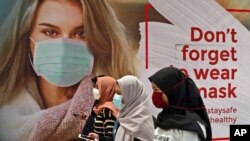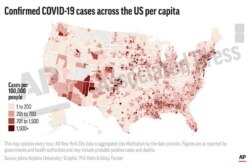The World Health Organization says 60 percent of the world’s 10 million coronavirus cases since December came in the month of June – a sign that the pandemic is getting worse and not slowing down.
WHO chief Tedros Adhanom Ghebreyesus said Wednesday that more than 160,000 new cases are reported every day.
He said countries must take what he calls a “comprehensive approach” in battling the virus.
"Find, isolate, test and care for every case; trace and quarantine every contact; equip and train health workers; and educate and empower communities to protect themselves and others,” Tedros said.
He added that those countries taking a “fragmented approach” have a “long, hard road ahead.”
“Not testing alone. Not physical distancing alone. Not contact tracing alone. Not masks alone. Do it all,” Tedros said. He said one of the lessons learned in the past six months is that “it’s never too late … no matter what situation a country is in, it can be turned around.”
Tedros pointed out that wearing masks saves lives. U.S. President Donald Trump has yet to be seen wearing one in public. But after months of pooh-poohing the idea of masks, Trump said Wednesday he would now have “no problem” putting one on.
"If I were in a tight situation with people, I would, absolutely," the president told Fox Business news.
"I'm all for masks. I think masks are good. Actually, I had a mask on. I sort of liked the way I looked. It was OK. It was a dark, black mask, and I thought it looked OK. ... If people feel good about it they should do it."
But Trump said he doubts wearing them should be mandatory and repeated his belief that COVID-19 will just “disappear” at some point.
But medical experts say they believe the virus is here to stay, just like the virus that causes the common cold.
Setting records for new cases
A new Reuters poll shows Americans’ anxieties about the coronavirus are at an all-time high.
Eighty-one percent of those surveyed earlier this week say they are very concerned or at least somewhat concerned about COVID-19, while only 40 percent approve of the way Trump has handled the outbreak.
The number of cases continues to grow in most U.S. states with some setting records for the number of new cases every day, mostly in the South and West.
New Jersey Gov. Phil Murphy has put reopening bars and restaurants in his state on pause, blaming what he describes as “knucklehead behavior” by people not wearing masks nor practicing social distancing.
California has again shut down bars, theaters and indoor restaurant dining. New York City Mayor Bill de Blasio has put plans to reopen indoor dining rooms on hold because of a possibility of infected people from elsewhere flocking into the city.
South Carolina's state epidemiologist, Dr. Linda Bell, said the number of new cases is overwhelming the ability of health officials to track down the victims. She said if people don't wear masks and keep proper distance, their friends and loved ones will die.
McDonald’s will again close its dining rooms for another three weeks, restricting service to drive-in windows and parking lot deliveries. Indoor seating under the iconic golden arches had started to resume in some states.
But public health experts said there is little evidence the nationwide protests against police violence that erupted in May after George Floyd’s death in Minneapolis have been part of the spike in COVID-19 cases.
If that had been the case, the experts said, the jump in COVID-19 numbers would have come two weeks after the marches began instead of weeks later. Fourteen days is the incubation period for the virus.
Elsewhere
Canada’s official birthday celebration, Canada Day, was a virtual one Wednesday for the first time. Entertainment, speeches and fireworks were all done online even though parts of the country have begun to reopen.
Hundreds of Czech citizens sat down to dinner Wednesday at a 500-meter-long table spanning the Charles Bridge in Prague to celebrate that country’s reopening after more than three months.
Only about 12,000 cases and 349 deaths have been reported in the Czech Republic. Authorities credit tough restrictions and lockdowns for the relatively low numbers.
Another industry that took a hit from COVID-19 is starting to return – Amsterdam's famed red-light district welcomed visitors and tourists Wednesday.
But the city’s exotic dancers, prostitutes and other sex workers are being advised to avoid kissing and so-called unusual activities to avoid a coronavirus flare-up.






